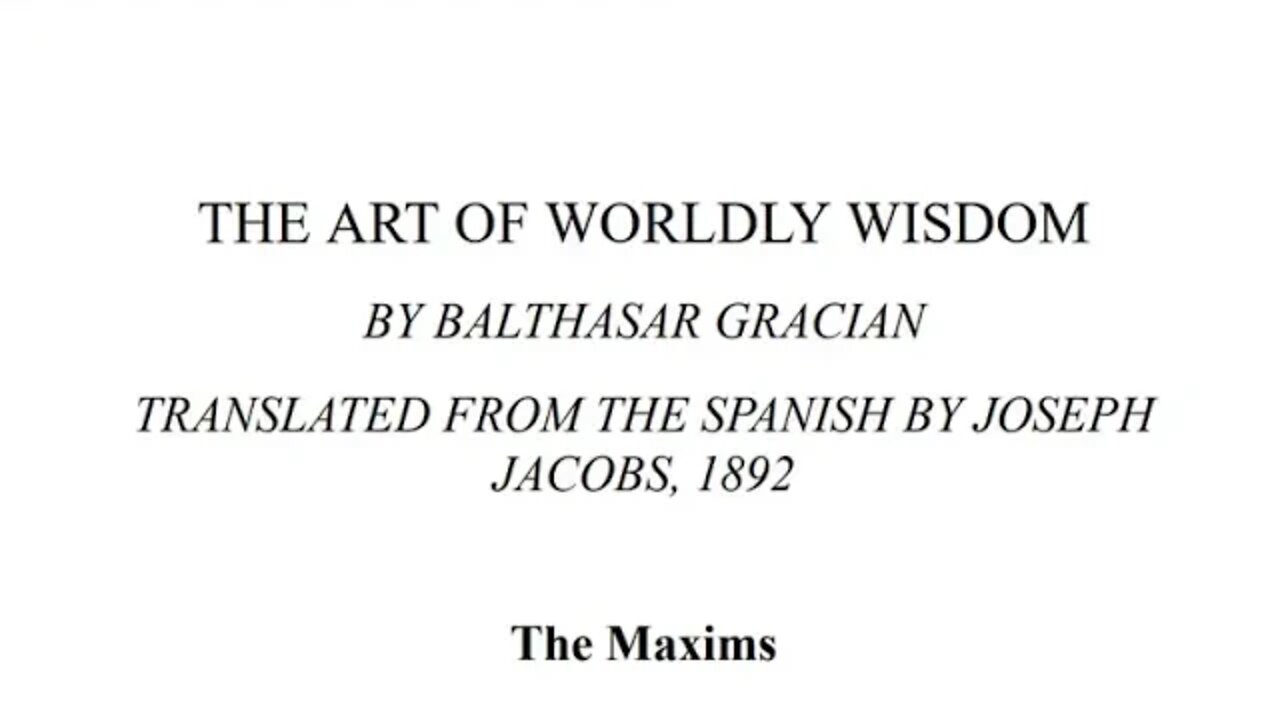Premium Only Content

THE ART OF WORLDLY WISDOM, Baltasar Gracián
Baltasar Gracián y Morales, S.J. (Spanish: 8 January 1601 – 6 December 1658), better known as Baltasar Gracián, was a Spanish Jesuit and baroque prose writer and philosopher. He was born in Belmonte, near Calatayud (Aragon). His writings were lauded by Schopenhauer and Nietzsche.
He assumed the vows of the Jesuits in 1633 and dedicated himself to teaching in various Jesuit schools. He spent time in Huesca, where he befriended the local scholar Vincencio Juan de Lastanosa, who helped him achieve an important milestone in his intellectual upbringing. He acquired fame as a preacher, although some of his oratorical displays, such as reading a letter sent from Hell from the pulpit, were frowned upon by his superiors. He was named Rector of the Jesuit College of Tarragona and wrote works proposing models for courtly conduct such as El héroe (The Hero), El político (The Politician), and El discreto (The Discreet One). During the Spanish war, he was chaplain of the army that liberated Lleida in 1646.
The Art of Worldly Wisdom
Gracián's style, generically called conceptism, is characterized by ellipsis and the concentration of a maximum of significance in a minimum of form, an approach referred to in Spanish as agudeza (wit), and which is brought to its extreme in the Oráculo Manual y Arte de Prudencia (literally Manual Oracle and Art of Discretion, commonly translated as The Art of Worldly Wisdom), which is almost entirely composed of three hundred maxims with commentary. He constantly plays with words: each phrase becomes a puzzle, using the most diverse rhetorical devices.
Its appeal has endured: in 1992, Christopher Maurer's translation of this book remained 18 weeks (2 weeks in first place) in The Washington Post's list of Nonfiction General Best Sellers. It has sold nearly 200,000 copies.
Nietzsche wrote, "Europe has never produced anything finer or more complicated in matters of moral subtlety," and Schopenhauer, who translated it into German, considered the book "Absolutely unique... a book made for constant use... a companion for life" for "those who wish to prosper in the great world." A translation from the Spanish by Joseph Jacobs, first published in 1892, was a huge commercial success, with many reprintings over the years. Jacobs's translation is alleged to have been read by Winston Churchill, seven years later, on the ship taking him to the Boer Wars.
https://archive.org/details/the-art-of-worldly-wisdom-baltasar-gracian.
Art of Worldly #Wisdom, Worldly Wisdom, Balthasar, Baltasar, #Gracian, Spanish, Spain, Proverb, Maxim, Aphorism, Advice, #Selfhelp, #Jesuit, #Nietzsche, #Schopenhauer
-
 8:01
8:01
MattMorseTV
8 hours ago $2.47 earnedTrump just DROPPED a BOMBSHELL.
18.7K31 -
 LIVE
LIVE
This is the Ray Gaming
1 hour ago $0.02 earnedHead Shots and Heart Breaks | Rumble Premium Creator
48 watching -
 LIVE
LIVE
tangodelta
2 hours agoGray Zone Warfare - Lamang Real Estate
57 watching -
 1:34:52
1:34:52
Glenn Greenwald
6 hours agoIs There Evidence of Epstein's Ties to Israel? Yes: Ample. Brazil's Chief Censor Orders Rumble to Ban US Citizen and Turn Over Data | SYSTEM UPDATE #486
117K89 -
 2:08:28
2:08:28
megimu32
2 hours agoOTS: Movies That Scarred Us… and Made Us Scream HELL YEA!
5345 -
 LIVE
LIVE
Lindyrigg87
3 hours agoGentle Lurking... My first time
20 watching -
 1:05:16
1:05:16
BonginoReport
5 hours agoMore Questions Than Answers After Assassination Attempt Anniversary - Hayley Caronia (Ep.89)
156K95 -
 1:12:52
1:12:52
Kim Iversen
7 hours agoTucker Calls Out Israeli Blackmail — GOP Reels Into Civil War
126K199 -
 LIVE
LIVE
zTeMpLaRz
1 hour ago(XBOX) - Eldenring Nightreign Co-Op w/ wifey lets gooo!!
29 watching -
 DVR
DVR
JohnnyDrop
2 hours agoJOHNNY DROP | WE'RE BACK BABY!
39